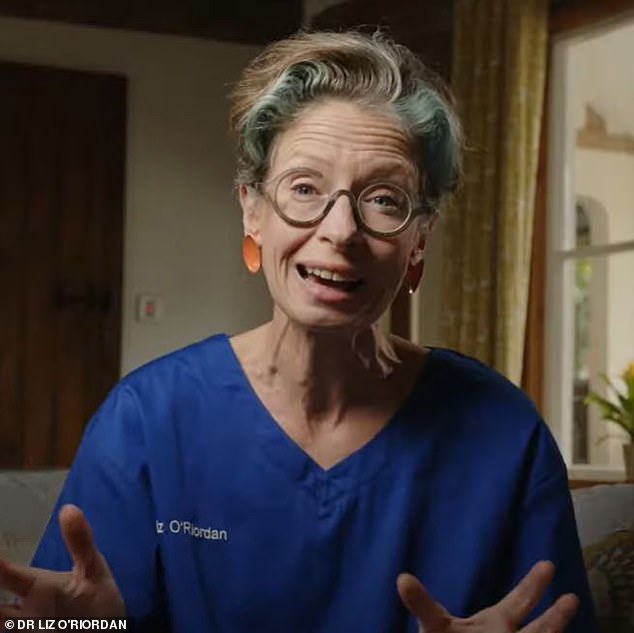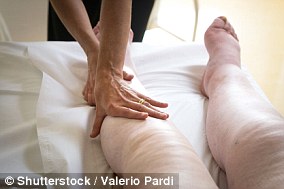Viral TikTok clip sparks panic with suggestions breast cancer can be triggered by a SPORTS BRA – doctor claims the tight tops can ‘trap’ fluids
A TikToker has sent social media into a frenzy after claiming that wearing sports bras often caused a lump in her breast.
Kelly Noble, an empowerment coach from Arizona, told her 12,000 followers that the growth she developed – which turned out to be harmless – was the result of the excessive compression of sports bras, which causes fluids to become ‘trapped’ in nearby glands of the skin. the chest.
“If you wear a sports bra all the time, you need to stop,” she said in the TikTok video, which has 7.8 million views. “The doctor said fluid can get trapped in it from your lymph nodes (glands next to the breasts and under the armpits), and if you have constant compression on it, it will get extra fluid because it can’t go anywhere.”
The clip (below) has attracted more than 8,000 comments, mostly from young women, who are increasingly being diagnosed with cancer amid fears they too are at risk.
“…I’m wearing one right now…I’m taking it off,” one woman wrote, while another said she was “super nervous” after watching the video.
“I wear a sports bar all the time because I work construction and I have to wear one,” she added. Another wrote: ‘I have lumps and my doctor never gave me this information and now I’m so glad you said this.’
Ms. Noble then relayed more strange advice from her doctor. To help with this build-up of fluid, take off your bra, raise your arm and ‘lightly’ tap the breast.
“Bend over and shake your tits to help with all the fluid,” she said.


A TikToker has claimed breast lumps could be caused by sports bra compression – but breast surgeons say such ideas are ‘nonsense’
However, experts have debunked the myth, claiming Ms Noble’s doctor was misinformed.
Dr. Liz O’Riordan, a breast cancer surgeon in Britain, posted a YouTube video debunking the claims Monday: “I have no idea where her doctor went to medical school, but this is nothing,” said Dr. O’Riordan, who has had breast cancer twice. “I’m here to tell you it’s bullshit.”
Dr. O’Riordan explains that fluid does not get trapped in the lymph nodes. First, she says, fluid flows from the vessels at the bottom of the breast up to the lymph nodes — not the other way around, as the video suggests.
As for Ms. Noble’s suggestion: “If your breasts are healthy, the lymphatic vessels in the skin will automatically drain excess fluid.”
The surgeon adds that some women will experience breast swelling caused by fluid if they have had certain cancer treatments, such as radiotherapy – a condition called lymphedema.
This is where fluid that is normally drained from the body accumulates in the fatty tissues, such as the chest, arms and legs. And for these women tapping doesn’t help.
Dr. O’Riordan instead recommends a firm breast massage, which can be done by placing one hand on the chest on the opposite side of the body. The fingertips should press into the armpit.
You can then squeeze your hand over the breast in a pumping motion.
“If you wiggle and shake your breasts, all you have to do is go ‘ow’ and look ridiculous,” said Dr O’Riordan.
She also doesn’t recommend ditching the sports bra, especially if you’re physically active.
When running, breasts can bounce up to 6 inches in any direction. Breasts are made up of fat, connective tissue and ligaments, but have no muscles to hold them in place. Larger breasts also tend to move more.
‘This can be painful and uncomfortable and may prevent you from being active,’ said Dr O’Riordan. ‘It can also lead to sagging or sagging breasts, as the ligaments permanently stretch.’
“That’s why it’s important to wear a sports bra.”

Dr. Liz O’Riordan, a breast cancer surgeon in Britain, took to YouTube this week to debunk Ms Noble’s claim and advise her against breast movement
Breast cancer is the most common form of cancer in both the US and the world. The National Cancer Institute (NCI) estimates there will be more than 300,000 new cases this year, along with 43,700 deaths.
However, mortality rates fell by 43 percent between 1989 and 2020 after successful public health awareness campaigns, better screening and new medications.
Nine out of ten patients are expected to survive after five years.
All women aged 50 to 74 are advised to have a mammogram, an energy-efficient x-ray of their breasts, checked every two years.
According to the American Cancer Society (ACS), the average age of breast cancer diagnosis is 62 years.

